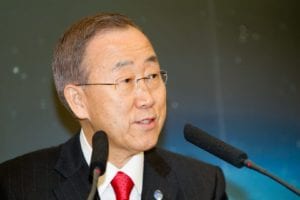Africa needs significant investment, UN Secretary-General Ban Ki-moon told the General Assembly’s high-level debate on investment in Africa.
“In recent years, Africa’s economic growth has been higher than in many other regions. Even at the peak of the global financial crisis, the continent continued to drive forward. United Nations economists estimate that Africa’s overall growth will exceed 5% in 2015, driven especially by domestic demand and solid commodity prices. But, this positive performance must not let us become complacent,” said Ki-moon. However, the secretary general highlighted that fact that serious obstacles still exist to more inclusive and sustainable economic and social development. Basic infrastructure, from health care and sanitation to energy and transport networks, is lacking. “As we shape a post-2015 development agenda that will deliver a life of dignity for all, it is plain that Africa needs significant investment,” he said. Ki-moon believes that Africa needs three things: enabling environments that promote investment and reduce risk; the right kind of investment; and wise management of the proceeds so they support sustainable development. Despite investment in Africa increasing to the point where it exceeds official development assistance, much of this investment has been related to resource extraction and exports, with not enough being channelled into vital development needs. There are many critical financing gaps, especially in agriculture, infrastructure and industrialization, which are now the focus of Africa’s development agenda. Energy“Africa is desperately energy-poor. Less than a quarter of the people have access to electricity. If we exclude South Africa, Africa’s electricity output is little more than half of the 40,000 megawatts available to New York City. Yet Africa has vast untapped resources,” Ki-moon told the assembly.
He believes Africa is poised to take advantage of a new energy revolution and promote low-carbon growth. New technologies for renewable resources such as solar and wind power are becoming much more affordable. New gas discoveries and major hydropower projects can also help Africa’s development, especially if allied to investment in creating pathways for countries to sell their power to others.
“[I]nvestment is essential, and when it is the right investment, it can be effective, benefitting people, businesses and governments alike.” Continued investment In a year’s time, the Third International Conference on Financing for Development in Addis Ababa will provide an opportunity to review the implementation of commitments made in Monterrey and Doha, and reinvigorate the financing for development follow-up process. Ki-moon stressed that countries must remain committed to fulfilling ODA commitments. “The United Nations is committed to supporting Africa’s transformative development agenda and to helping to promote private sector engagement in that vision,” he said. “By taking such a comprehensive approach to promoting investment, I am convinced that we can achieve far-reaching and sustainable improvements to Africa’s development prospects. Success hinges on the engagement of a range of actors, including governments, business, finance and civil society. The United Nations stands ready to serve as a facilitator to drive this process forward.”






